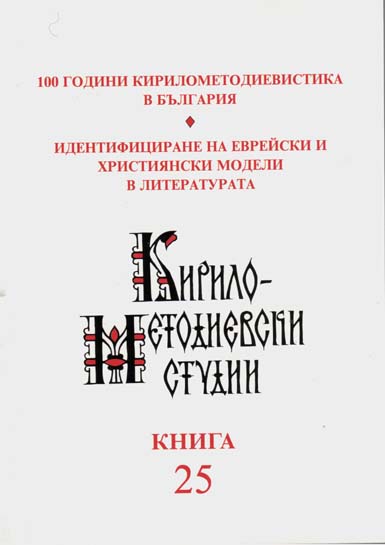Византийската имперска идея и претенциите на цар Симеон според словото „За мира с българите"
Byzantine Imperial Ideology and the Claims of Tsar Symeon I According to the Homily “On the Treaty with the Bulgarians”
Author(s): Kirił MarinowSubject(s): 6th to 12th Centuries
Published by: Кирило-Методиевски научен център при Българска академия на науките
Keywords: Homily “On the Treaty with the Bulgarians”
Summary/Abstract: The rhetoric work „On the Treaty with the Bulgarians”, delivered most probably during the celebrations following the Byzantine-Bulgarian peace treaty of 927, is an interesting and important source to learn about the imperial views of the East Roman Empire elites. It is firstly due to the fact that the author characterized the ideological attitude of the relations between the Byzantines and the Bulgarians since the baptism of the latter in mid-9th century. Secondly, he laid out his ideas in the context of the just finished armed conflict and the underlying imperial pretenses of Symeon I, the Bulgarian ruler, who ruled between 893–927. Thirdly, unlike in the traditional imperial Byzantine ideology, referring back to the Roman traditions, the author put particular emphasis on the religious basis of the Orthodox faith, common to Byzantines and Bulgarians. According to the author the most important task of the Byzantine Empire was to establish peace and to care for its persistence. The peace granted to the world by God means the peace which is in fact Christ himself. The peace which would provide a harmonious development and prosperity not only to the subjects of the Constantinopolitan ruler but also to all people of the world. The imperial power was a guarantee of a peaceful coexistence of all Christian people and of God’s blessings upon them. It was possible, provided that all of them would accept the earthly hierarchy of secular rulers, established by God and reflecting the heavenly one of angels and spirits; the hierarchy on the top of which there stood the Byzantine autokratoros, whose objective was to lead all people to the Almighty. The ruler had to be a Byzantine/Roman in the political not ethnic sense. No other ruler, even from the so-called Byzantine Commonwealth of Nations had the right to rule the Romans and to influence the life in whole inhabited world. No other was worthy to bear the title of basileus, particularly when he demanded it in an armed way rather than by his peace-making activities (like Peter I) – but even in that case the title was of ethnic nature only (the Byzantines understood it as emperor of the Bulgarians) and it had to be sanctioned by the Roman emperor. Our author, although emphasizing the religious unity of the Byzantines and Bulgarians, upheld the uniqueness and exclusivity of the imperial power.
Journal: Кирило-Методиевски студии
- Issue Year: 2016
- Issue No: 25
- Page Range: 342-352
- Page Count: 11
- Language: Bulgarian
- Content File-PDF

